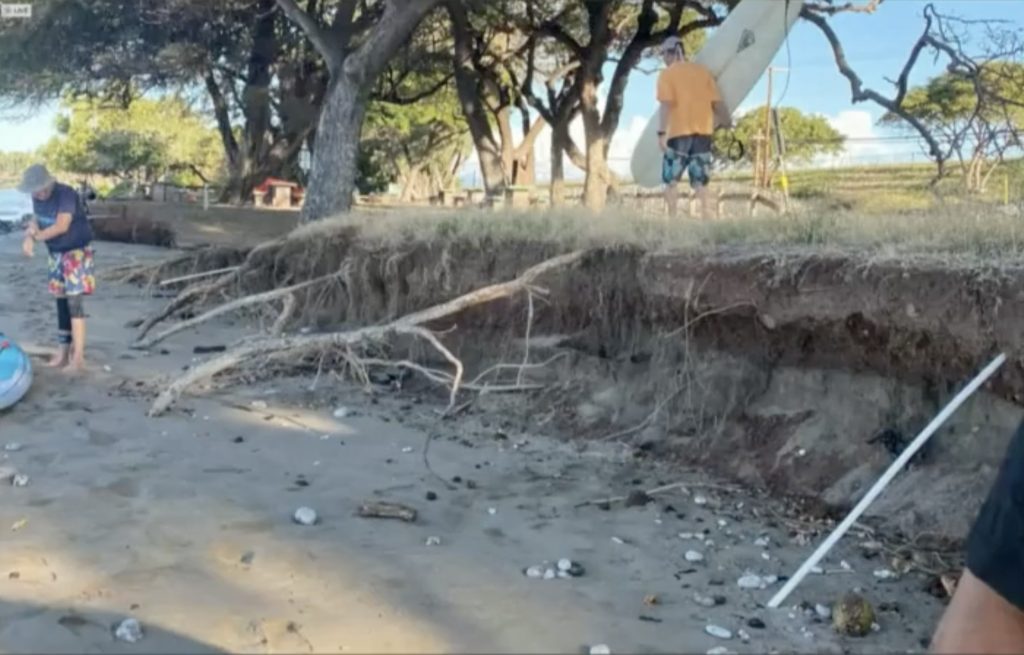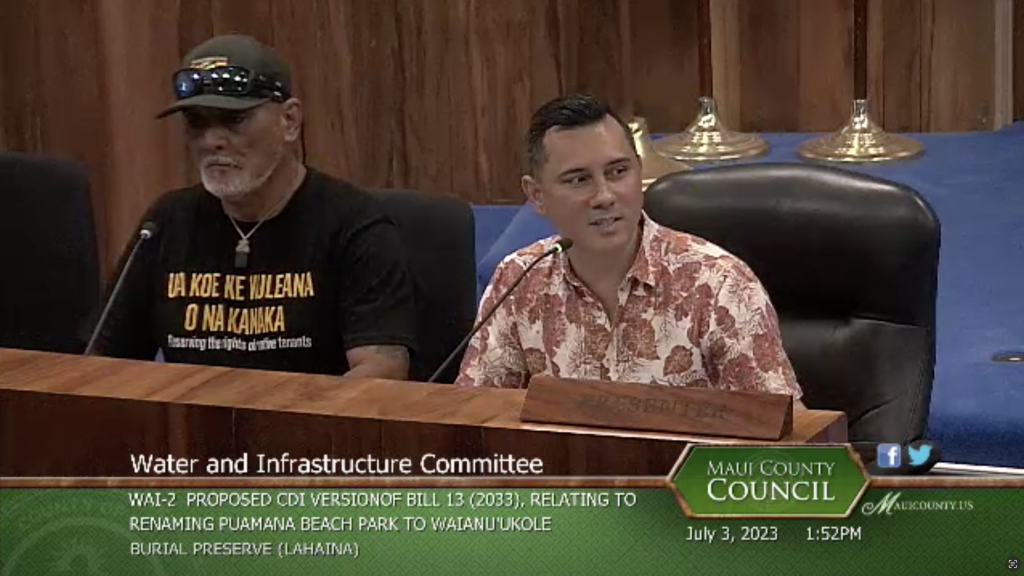Committee agrees to revise proposed renaming of Puamana burial site to include Waianuʻukole

The Water and Infrastructure Committee agreed on a proposal Monday to rename Puamana Beach Park in Lahaina to Puamana Cultural Preserve at Waianuʻukole.
During an earlier meeting on May 26, the committee had considered the renaming of Puamana Beach Park to Waiahiokole Burial Preserve; however, further research prompted a revision in the proposed name change to Waianuʻukole.
The name “Waianuʻukole” can mean two things, according to a presentation by cultural practitioner Cody Pueo Pata:
- Water of the Nuʻukole (a variety of ʻoʻopu also known as hiʻukole).
- Grain like the Nuʻukole (ʻoʻopu or goby fish), in reference to a type of stone used for heʻe (squid) lures which was streaked with red and black.

West Maui resident, Keʻeaumoku Kapu, CEO of Aha Moku said, “I’m glad it has gone in this direction to make sure we provide clarity, because we’re coming across a lot of information that I wasn’t privy to at the time. I’m glad we’re going this route to make sure that things are pono.”
According to Kapu, 11-12 boxes of iwi kupuna remains were reinterred along the shoreline monument after the bones washed up from erosion. He said the iwi found in the area were pre-contact and it was important to give reverence to the original place name. “It would only be fitting that the name of that general area, Waianuʻukole, should be the preferred name,” he said.
Hailama Farden, a resident with familial connections to Lahaina, said “The Farden family would not stand in the way of setting straight the proper names of the area… I appreciate that learning of these things is so constant that it is current–meaning something [was] offered to you in May, more information [was] gained here in July, and I’m sure more information will [come] moving forward.”
According to research detailed in Pata’s presentation:
ARTICLE CONTINUES BELOW ADARTICLE CONTINUES BELOW AD“Puamana was the family home of Annie Kahalepouli Shaw Farden and Charles Kekua Farden. Their large two-story home, built in 1915 was located on Front Street. When the Farden’s purchased the half-acre lot, it was already named Puamana. They agreed to keep the name for their home, translating it to mean ‘the home that holds its members close. Puamana is probably best known to Hawaiʻi’s residents through the song of the same name. Armgard Farden Aluli, one of the 12 Farden children, composed it in 1935. Puamana Beach Park and Puamana subdivision adjacent to the park took their name from the Farden’s family home, also known as Mākila.”
“I thought that it would be nice, if we take it away, that it could live somewhere, somehow,” said Farden. “Especially that acknowledgement to Aunty Emma for her years of aloha for Maui and her lifetime of aloha and service to Lahaina…. I don’t think I have a recommendation on how, but somebody might have wisdom on what could be done… It would be lovely if they created a hula stadium on Maui, they could name it after Aunty Emma, or something like that, but I would leave that to your wisdom as council members and perhaps some ideas might come up later.”
In earlier testimony, Dr. Janet Six, principal archaeologist for the County of Maui expressed support for the change, saying that the area is historically a large grave site.
As far as iwi are concerned, Pata said that since bones were found in flexed positions, that indicates they were from pre-contact times. He said it is unclear if they were interred as part of a burial ground or from war/battles in the area.
Pata explained that in 1738, part of the largest series of battles took place in the Lahaina moku, which stretched from Ukumehame into Kāʻanapali. “The two sons of Kekaulike fought against each other and Alapaʻi came to support Kamehameha Nui… Alapaʻi’s forces stretched from Ukumehame to Māla… so it is conceivable that some of the iwi in the area might come from those series of battles as well,” said Pata.
Pata said he did not have a preference as far as the burial name, but offered his support and opinion as a cultural resource person that the name of the area is Waianuʻukole.
Committee chair Tom Cook thanked the those who contributed to the process, “of reviewing it, of being thorough, of being compassionate and patient to get it right.”




_1768613517521.webp)


